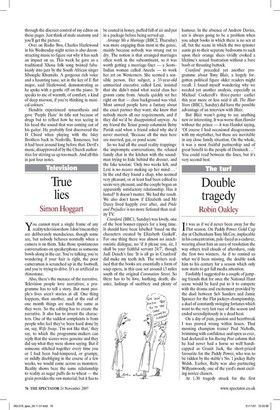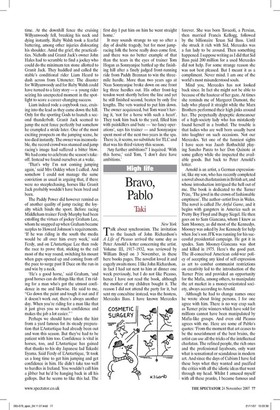Double tragedy
Robin Oakley It was as if we'd never been away for the Flat season. On Paddy Power Gold Cup day at Cheltenham Tony McCoy, implacable in his concentration, pale-faced as a cadaver, wearing about him an aura of resolution the way others trail clouds of aftershave, rode the first two winners. As if to remind us what we'd been missing, the double took him to his century for a season which only now starts to get full media attention.
Foolishly I suggested to a couple of jumping friends that for once the National Hunt scene would be hard put to it to compete with the drama and excitement provided by the duel between Seb Sanders and Jamie Spencer for the Flat jockeys championship, a duel of constantly swinging fortunes which went to the very last race of the season and ended serendipitously in a dead heat.
On a day of pain, passion and heartbreak I was proved wrong within hours. That morning champion trainer Paul Nicholls, brimming with confidence and open as ever, had declared in his Racing Post column that he had never had a horse so well handicapped as Granit Jack, the short-priced favourite for the Paddy Power, who was to be ridden by the stable's No. 1 jockey Ruby Walsh. Earlier, Ruby was also partnering Willyanwoody, one of the yard's most exciting novice chasers.
At 1.30 tragedy struck for the first time. At the downhill fence the cruising Willyanwoody fell, breaking his neck and dying instantly. Ruby Walsh took a fearful battering, among other injuries dislocating his shoulder. Amid the grief, the practicalities. Nicholls and Granit Jack's owner John Hales had to scramble to find a jockey who could do the minimum ten stone allotted to Granit Jack. They huddled and called the stable's conditional rider Liam Heard to dash across from Uttoxeter. The disaster for Willyanwoody and for Ruby Walsh could have turned to a fairy story — a young rider seizing his unexpected moment in the spotlight to score a career-changing success.
Liam indeed rode a copybook race, cruising into the lead as they came down the hill. Only for the sporting Gods to launch a second thunderbolt. Granit Jack seemed to jump the next fence perfectly but somehow he crumpled a stride later. One of the most exciting prospects on the jumping scene, he too died instantly. The owner was inconsolable, the record crowd was stunned and jump racing's image had suffered a bitter blow. We had come to celebrate the season's takeoff. Instead we found ourselves at a wake.
'That's why I'm not coming jumping again,' said Mrs Oakley when I called. And somehow I could not manage the same conviction as usual in arguing that, if there were no steeplechasing, horses like Granit Jack probably wouldn't have been bred and born.
The Paddy Power did however remind us of another quality of jump racing: the loyalty which binds the sport. Before racing Middleham trainer Ferdy Murphy had been extolling the virtues of jockey Graham Lee, whom he snapped up when Graham became surplus to Howard Johnson's requirements. 'If he was riding in the south the media would be all over him every week,' said Ferdy, and on EAntartique Lee then rode the race to prove that, sticking to the rail most of the way round, switching his mount when gaps opened up and coming from off the pace to surge past Ii Duce on the run-in and win by a neck.
'He's a good horse,' said Graham, 'and good horses can do things like that. I'm riding for a man who's got the utmost confidence in me and likewise. He said to me, "Go down the paint and tough it out and if it doesn't work out, there's always another day. When you're riding for a man like that it just gives you so much confidence and makes the job a lot easier."' Perhaps we should have taken the hint from a yard famous for its steady preparation that EAntartique had already been out and won this season. But they've had to be patient with him too. Confidence is vital in horses, too, and EAntartique has gained that thanks to his shy Japanese lad Takashi Iiyama. Said Ferdy of EAntartique, 'It took us a long time to get him jumping and get confidence in him He didn't take too well to hurdles in Ireland. You wouldn't call him a jibber but he'd be hanging back in all his gallops. But he seems to like this lad. The first day I put him on him he went straight home.'
It may sounds strange to say so after a day of double tragedy, but for most jumpracing folk the horse really does come first, and there was no better example of that than the tears in the eyes of trainer Tom Hogan as Sonnyanjoe battled up the finishing hill after a finely judged front-running ride from Paddy Brennan to win the threemile hurdle. More than two years ago at Naas Sonnyanjoe broke down on one front leg three hurdles out. His other front-leg tendon went shortly before the line and yet he still finished second, beaten by only five lengths. The vets wanted to put him down. The owner acquiesced, but Tom wasn't having it, 'not for a horse with such a heart'. They took him back to the yard, filled him with painkillers and bute — 'no fancy operations', says his trainer — and Sonnyanjoe spent most of the next two years in the spa. There is, it seems, no substitute for TLC and that was his third victory this season.
'Any further ambitions?' I inquired. 'With this horse,' said Tom, 'I don't dare have ambitions.'







































































 Previous page
Previous page